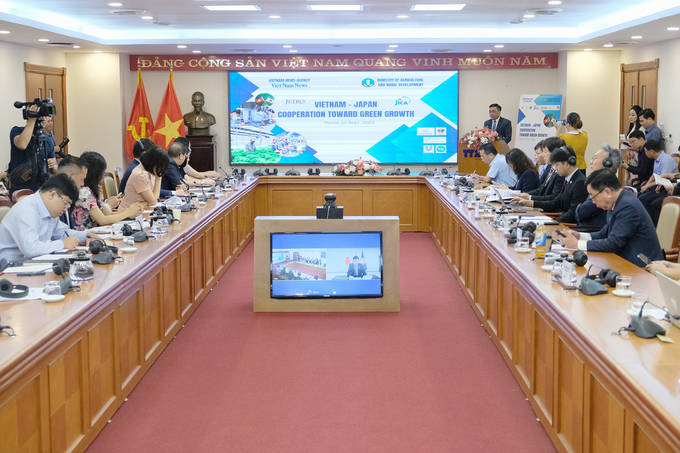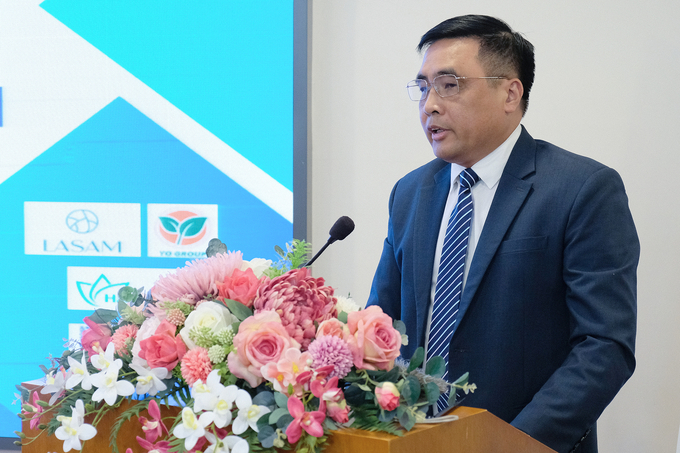November 24, 2025 | 17:39 GMT +7
November 24, 2025 | 17:39 GMT +7
Hotline: 0913.378.918
November 24, 2025 | 17:39 GMT +7
Hotline: 0913.378.918

Workshop with the theme 'Vietnam - Japan Cooperation Towards Green Growth' on the morning of September 12. Photo: Tung Dinh.
Vietnam News Agency collaborated with the Ministry of Agriculture and Rural Development to organize a workshop with the theme "Vietnam - Japan Cooperation Towards Green Growth" on September 12. The event was organized to celebrate the 50th anniversary of the establishment of diplomatic relations between the two countries.
The workshop was attended by heads of Vietnamese ministries and departments including the Ministry of Planning and Investment, the Ministry of Foreign Affairs, the Ministry of Industry and Trade, representatives from the Vietnamese Embassy in Japan, representatives from the Japanese Embassy in Vietnam, the Japan International Cooperation Agency (JICA), the Japan External Trade Organization (JETRO), leaders of several Vietnamese provinces and cities, as well as experts and businesses from both countries.
This event provided an opportunity for delegates to share their perspectives on green growth, opportunities, and challenges in implementing the National Green Growth Strategy between 2021 and 2030, with a vision towards 2050. It also discussed the significance of Japan's support for green development strategies in Vietnam and proposed recommendations for implementing these strategies.
Speaking from Japan, Ambassador of Vietnam to Japan Pham Quang Hieu said, "The bilateral relationship between Vietnam and Japan is currently at its best in the history of the two countries, deserving its role as a comprehensive strategic partnership based on sincerity, trust, and mutual support."
Regarding the medium and long term goals between 2030 and 2050, Ambassador Pham Quang Hieu believes that there is an abundance of potential for further cooperation between the two countries in green technology, energy transition, and bilateral research collaboration with the assistance of Japanese technology that are appropriate to Vietnam's capacity and transition path.

Deputy Minister of the Ministry of Agriculture and Rural Development Nguyen Quoc Trieu: Cooperation between Vietnam and Japan in the agricultural sector has played a significant role in the restructuring of the agricultural sector. Photo: Tung Dinh.
At the workshop, Deputy Minister of Agriculture and Rural Development Nguyen Quoc Trieu emphasized the importance of the agricultural cooperation between Vietnam and Japan in the restructuring of Vietnam's agriculture and the development of rural areas. Japan has continually supported Vietnam in building sustainable agricultural value chains, plant quarantine, disaster prevention, rural irrigation among many other sectors from 2020 to 2025.
Deputy Minister Nguyen Quoc Trieu stressed that Japan has been increasing its investments in agriculture in recent years, reaching nearly 240 million USD in 2020 with 42 projects, ranking sixth among foreign agricultural investors in Vietnam. Japanese investments average around 6 million USD per project, with one project reaching nearly 80 million USD. Japan has strengths in digital transformation, green agriculture, and green growth. The bilateral cooperation between Japan and Vietnam will create various opportunities for collaboration in areas where both sides have potential and strengths.
Additionally, Japan has extensive experience in developing safe, sustainable agricultural ecosystems that are environmentally friendly. Consequently, Japan's cooperation and support are crucial in implementing Vietnam's Agriculture and Rural Development Strategy, as emphasized by Deputy Minister Nguyen Quoc Trieu.
Ms. Vu Viet Trang, General Director of the Vietnam News Agency, representing the organizing committee, commented, "Through this dialogue, I believe that Japanese organizations and businesses will have more comprehensive information regarding Vietnam's green growth policy priorities, as well as region-specific priorities. It will open up new cooperation opportunities in areas where both sides have potential and strengths."
Conversely, the Japan External Trade Organization emphasized that focusing on green development is crucial to address pressing issues in Vietnam, including water quality, air pollution, waste management, recycling, energy efficiency, and carbon emissions. JETRO recommended that the Vietnamese government implement stricter environmental regulations, expand the environmental responsibilities of manufacturers, and accelerate the transition to renewable energy.
Additionally, the Japan International Cooperation Agency affirmed that it would closely collaborate with the Ministry of Natural Resources and Environment to enhance Vietnam's capacity to reduce carbon emissions, focusing on water resource management. JICA will also cooperate with agricultural businesses to improve living conditions and implement modern technology to mitigate the impacts of climate change and natural disasters.
As of August 2023, Japan has invested in 5,168 projects in Vietnam with a total registered capital of over 71 billion USD. Japan currently ranks third among the 143 countries and territories investing in Vietnam.
Translated by Nguyen Hai Long
/2025/11/22/4018-4-213342_747.jpg)
(VAN) The Mekong Delta Agricultural Experts Club has attracted 143 experts and researchers to participate in providing consultancy and contributing initiatives to the development of one million hectares of high-quality rice.

(VAN) Ca Mau’s development of OCOP products opens a path to increasing cooperatives value, helping boost income, expand markets, and affirm collective economy's role.

(VAN) Turning seemingly ordinary coconut shells into unique jewelry and artwork, Nguyen Bang Nhi spreads the value of local culture through her brand, Cocohand.

(VAN) Results from the Sustainable Durian Model Project in Dak Lak have confirmed the critical role of Yara Viet Nam in transferring advanced nutritional solutions to farmers.

(VAN) In Tuyen Quang province, livestock farmers have introduced effective models and innovative practices that significantly strengthen African Swine Fever prevention and control efforts.

(VAN) This is the study conducted by IRRI and Can Tho University on the rice straw value chain in Mekong Delta showing an economic potential of more than 6.6 trillion VND/year.

(VAN) By participating in cooperative economics, many farmers in Tay Ninh have overcome hardship, mastered clean dragon fruit cultivation techniques.